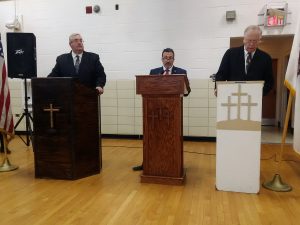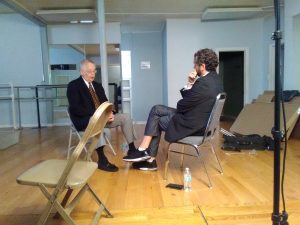Write-in coroner campaign in Lake County nets 8,500 for Rudd
Gregory Harutunian for Chronicle Media — November 30, 2016
The Lake County Coroner candidates were Democrat Michael Donnenwirth (left), Republican Dr. Howard Cooper, and Write-In Dr. Thomas Rudd, also the incumbent. Cooper topped the results with 143,321 votes. (Photo by Gregory Harutunian/for Chronicle Media)
The voter results from the Nov. 8 general elections were finalized Nov. 29 in Lake County, after the cutoff date for mailed and provisional ballots had expired, one week earlier.
Of the three county-wide posts, up for consideration, the coroner’s race grabbed the lion’s share of attention for its dramatic twists and turns that almost bordered on comedy.
Certified tallies showed the Republican candidate, Dr. Howard Cooper, as the winner with 143,321 votes, and the Democrat’s entry, Michael Donnenwirth, with 127,311 votes. The name missing from the ballot was incumbent coroner, Dr. Thomas Rudd, whose candidacy was relegated to a write-in campaign.
With a two-month window for “getting the word out,” Rudd garnered 8,524 votes. The electorate had to actively seek out the empty write-in slot for the office, type in a semblance of the name, enough for judges to distinguish intent, and then, cast the vote. All 415 county precincts have been canvassed, and the results authorized by the Lake County Clerk’s Office.

WBBM-TV reporter Brad Edwards (left) discusses the write-in campaign for coroner with Dr. Thomas Rudd, and what led to the effort. (Photo by Gregory Harutunian/for Chronicle Media)
“Historically, I cannot recall any write-in efforts with such a number although it was a county-wide race,” said Carla Wyckoff, the county clerk. “During the Mar. primary, there were four write-in candidates that needed to obtain a certain number of votes to appear on the Nov. 8 general election ballot. They were successful.”
Wyckoff also noted that election tallies from Nov. 8 are unofficial, with a 14-day period to allow straggling mailed and provisional ballots to be received at her office. “Those ballots are received and counted, but the results won’t be official until Nov. 22, and the sign-off is Nov. 29,” she said.
Unofficially, Rudd’s write-in total is among the most gathered in Lake County history, if not the most. The clerk’s office has archived election races dating back to 2009, with prior records stored on microfiche film. Online research reverts to election races in 1990, and spotty records for write-in candidates before that year. Waukegan, the seat of Lake County, was established in 1841, as “Little Fort.”
Rudd had encountered a clerical error on his petitions last December, when an objection by Mark Shaw, later chairman of the Lake County Republican Party led Rudd “to do the honorable thing,” and withdraw from the race. A subsequent bid for an Independent candidacy required obtaining a minimum of 10,300 voter signatures on petitions, from Mar. 29 through June 27.
Rudd amassed more than 14,300 signatures.
“We were put at a distinct disadvantage, and needed a certain number, just to make the ballot, and we exceeded that amount with more than 14,000,” he said. “That was stunning, and the Republican still fought to keep me off the ballot,” he said.
Democratic challenger Donnenwirth filed an objection with the Lake County Electoral Board of Review, based on a state election law that prevents an individual from running for an established party and as an Independent candidate in the same election cycle. He was represented by Evergreen Park-based Odelson and Sterk Ltd., with Shaw seated near and conversing with Donnenwirth, during the hearing. The firm represented objectors throughout the court process.
The objection was upheld, and a judicial review hearing by Lake County Judge Diane Winter followed suit, although an Effingham County judge had declared the law unconstitutional. A state appellate court issued a written ruling, and the state supreme court refused to hear the case, a day before the Sept. 8 printing of ballots.
Rudd had raised controversy with his decisions to change the cause and manner of death in several high-profile reversals including the Darrin Hanna and Melissa Calusinski cases, as well as drawing fire for his stance with the suicide of former Fox Lake Lt. Charles Gliniewicz, based on forensic and scientific data.
“To get 8,500 write-in votes is really an affirmation that what we were doing in the coroner’s office was the right thing,” said Rudd. “It also affirms that honesty in office and politics are not compatible.”



